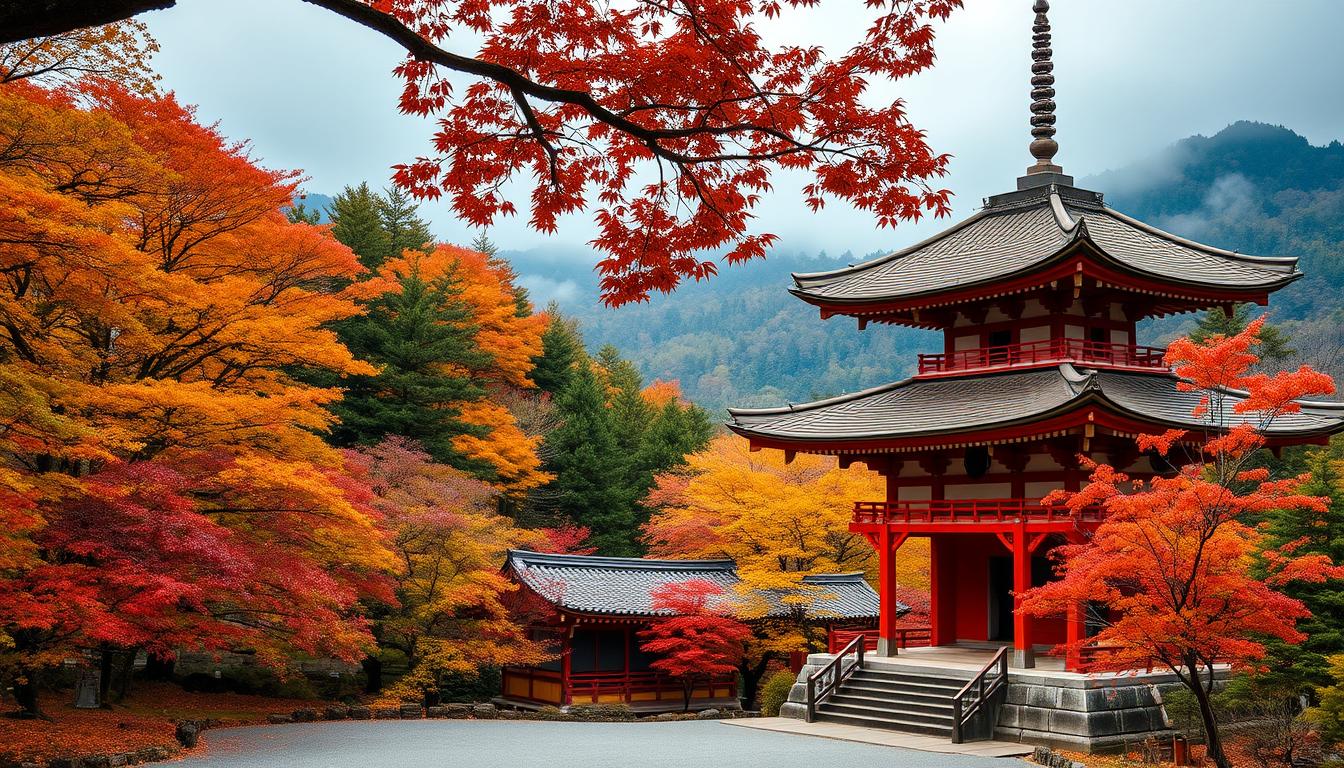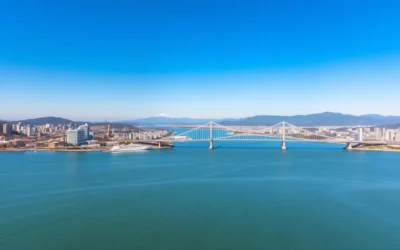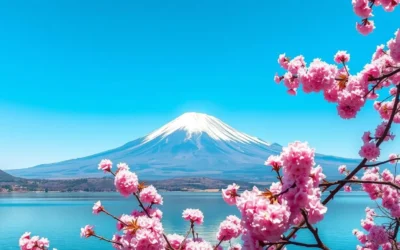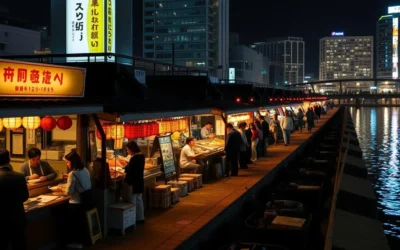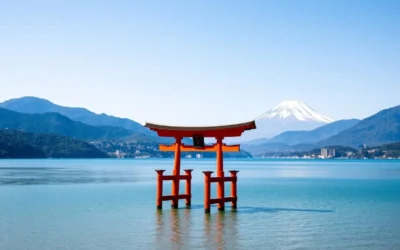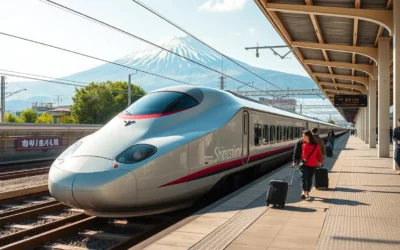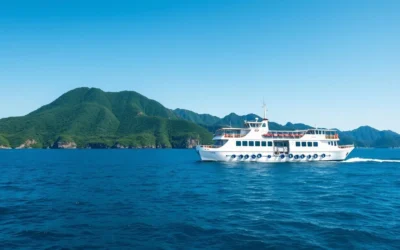✓ Accommodations✓ Flights✓ Rental Cars✓ Tours & Activities ✓ Tours & Activities
Have you thought about the best time to visit Nikko, Japan? This town is known for its calm nature, deep culture, and changing beauty with each season. Imagine planning your visit to match the perfect weather and see the town’s natural wonders at their best. Let’s find out when to visit Nikko for a trip that is both awe-inspiring and smart.
Nikko is a serene place in Japan’s Tochigi Prefecture. It’s well-loved for its natural scenery and history. But, picking the right time to go matters a lot. Nikko’s weather changes a lot throughout the year. We’ll look at the top times to visit Nikko. This includes the weather, scenery, and best travel times for a trip that ticks all the boxes.
Key Takeaways
- Nikko has something for every season, from beautiful cherry blossoms in spring to quiet winter scenes.
- Learning about Nikko’s weather helps plan the best time to visit and see its natural wonders.
- Spring (April-May) and fall (September-November) are great for a visit. The weather is nice, and the views are stunning.
- Bringing the right clothes and checking weather updates can make your trip smooth and fun.
- Nikko is near other cool places, making it ideal for side trips in Japan.
Introduction
Finding the best time to see Nikko, Japan, is key. The town’s weather shapes your experience a lot. Spring brings warm days filled with cherry blossoms. Winter turns Nikko into a peaceful snowy place.
Each season in Nikko has its magic. Knowing about them helps plan your trip to Japan well. You can prepare, pick the right clothes, and enjoy Nikko’s beautiful nature and culture.
Importance of Weather in Travel Planning
When heading to Nikko, weather matters a lot. It affects sightseeing, outdoor fun, and your trip’s vibe. Knowing Nikko’s seasonal weather and temperature helps.
This knowledge guides you on the best time to visit, what to wear, and what to do.
Overview of Nikko’s Climate and Seasons
Nikko has clear seasonal changes, offering unique weather patterns each season. It helps to know these differences. This way, you can plan a trip that fits Nikko’s charm.
Spring in Nikko (March – May)
In Nikko, spring turns the town into a lively place full of color. It happens from March to May. This time, the weather is nice, with temperatures between 50°F and 70°F. There might be some rain, but it’s not a lot.
Cherry Blossom Season
The most special part of Nikko’s spring is the cherry blossom season. It usually reaches its peak in April. The whole town gets covered in pink, thanks to the cherry trees. This scene is just beautiful and attracts people from everywhere.
Festivals and Events
Nikko’s spring also means exciting cultural events. The Nikko Flower Festival and the celebrations at the Toshogu Shrine are big highlights. They let you see Nikko’s traditions through music, dance, and food. It’s a great way to experience the town’s unique charm.
Summer in Nikko (June – August)
The summer months in Nikko, from June through August, are
hot and humid.
Average temperatures are between 70°F and 85°F. This is a great time for
outdoor activities and seeing Nikko’s natural beauty.
Visit stunning waterfalls like Kegon Falls. You can hike in forests or swim in Lake Chuzenji. Nikko’s shrines and temples also welcome many visitors, showcasing its culture.
Outdoor Activities and Attractions
In summer, Nikko’s natural sites are full of life. Its famous waterfalls, including Kegon Falls, show off their power. Hiking in Nikko National Park, you can enjoy the beautiful nature and maybe see some local animals.
Looking to cool down? Lake Chuzenji’s waters are perfect for that. You can swim, boat, or just relax by the shore. The view of the mountains is amazing.
Moreover, Nikko’s cultural spots, like its shrines and temples, are always worth a visit in summer. They teach you about Japan’s history and Nikko’s cultural importance.
Fall in Nikko (September – November)
Autumn in Nikko, from September to November, is a magical time. The area turns into a vibrant mix of red, orange, and yellow. This brilliant show attracts visitors from all over to see Nikko’s fall colors. The weather is perfect for exploring, with temperatures between 57°F and 82°F.
Nikko’s Stunning Autumn Foliage
Nikko shines as fall arrives, showing off with brilliant colors. Maple and ginkgo trees light up the area. Everywhere you look, there are warm, beautiful hues. It’s the perfect time to walk the trails, visit historic sites, and see the reflections in the lakes.
Ideal Temperatures for Sightseeing
The weather in Nikko during fall is comfortable and ideal for exploring. With temperatures from 57°F to 82°F, it’s great for being outside. You can walk the town, hike, and enjoy the season’s beauty without feeling too hot or cold.
Cultural Events and Festivals
In fall, Nikko is alive with cultural events and festivals. The Nikko Toshogu Festival is a highlight. It celebrates the Toshogu Shrine, a UNESCO World Heritage Site. The Nada no Kenka Matsuri lets you see a fun tradition where locals show off their strength. These events let you dive into Nikko’s vibrant culture.
Winter in Nikko (December – February)
Nikko turns into a magical winter wonderland when the snow starts to fall. From December to February, it gets cold, with temperatures between 32°F and 45°F. If you’re lucky, you might even see heavy snow. The chilly weather might make some people stay home, but there’s so much to do in Nikko during winter. It becomes a really special place to visit.
Snow and Cold Temperatures
The snowy winters in Nikko are quite something. The temples, shrines, and nature look beautiful covered in white. Yes, it’s cold, but this sets the scene for enjoying winter sports and outdoor fun.
Winter Sports and Activities
Love skiing? Then you’re in for a treat at Yumoto Ski Resort. It’s not just about the ski; you’ll also see amazing mountain views. For a calmer winter vibe, try snowshoeing, skiing in the woods, or skating on Lake Chuzenji.
Warm Onsen (Hot Springs) Experience
Nothing beats soaking in Nikko’s famous onsen after a day of winter adventures. These hot springs warm you up and make you feel brand new. It’s a really peaceful way to enjoy winter.
Nikko, Japan: Best Months for a Weather-Savvy Trip
The ideal times to visit Nikko, Japan, are in April-May and September-November. These months have great weather for outdoor fun. In spring, the town is lovely. Cherry blossoms bloom everywhere, and the weather is perfect for sightseeing.
April – May: Mild Spring Weather and Cherry Blossoms
The weather in Nikko is amazing from April to May. It’s not too cold or too hot, perfect for enjoying the sights. You’ll see the famous cherry blossoms all around, painting the town in shades of pink. These months are fantastic for being outside and taking part in cultural events.
September – November: Comfortable Temperatures and Fall Foliage
In September through November, Nikko shines. The weather is cool and pleasant, great for exploring. It’s also the time to see the incredible autumn foliage. The trees and temples turn bright shades of red, orange, and yellow, making Nikko even more beautiful.
Tips for Packing and Planning
When planning your Nikko trip, knowing the right clothing is key. Learn about the weather there to pack smart. This way, you’ll have a comfy and fun time.
What to Wear in Each Season
Spring in Nikko is cool in the morning and warms up later. It’s smart to dress in layers. Summers are hot and humid, so breathable clothes help.
For autumn, pack long sleeves and a light jacket. Add comfy walking shoes for the weather changes. In winter, bring warm clothes, hats, gloves, and boots for the snow.
Checking Weather Forecasts
Keep an eye on Nikko’s weather reports before you go. This helps you be ready for any changes. It’s especially important during winter for heavy snow and storms.
Avoiding Extreme Weather Events
Nikko can have typhoons, lots of snow, or other tough weather. Stay updated on weather alerts. Know what to do in an emergency. Have a flexible plan for your trip.
Unique Weather-Related Experiences
In Nikko, the weather changes offer unique chances to see nature. Visiting in any season means you’ll get to enjoy a variety of weather attractions.
Viewing Nikko’s Waterfalls
Spring and summer bring Nikko’s waterfalls to life with melting snow and rain. The famous Kegon Falls and Ryuzu Falls are spectacular. They truly highlight Nikko’s weather-related attractions.
Hiking Trails and Scenic Viewpoints
In the fall, Nikko’s hiking trails and scenic viewpoints are stunning. Do some tough hikes or enjoy views from the mountains. You’ll be surrounded by Nikko’s natural beauty.
Winter turns Nikko into a snowy wonderland, making everything quiet and magical. The frozen waterfalls are particularly special at this time. It’s a unique way to see Nikko’s nature.
Accommodations and Transportation
When planning your Nikko trip, think about where you’ll stay and how you’ll get around. Nikko has old-fashioned ryokans and modern hotels, appealing to many budgets.
Best Areas to Stay in Nikko
In Nikko’s central district, you’re close to key sites like the Nikkō Tōshō-gū shrine and Kegon Falls. For peace and beautiful scenery, consider spots near
Lake Chuzenji
and
Nikko National Park
Getting Around Nikko
Getting around Nikko is simple because of its great public transport. Tourists can see the town’s wonders using
buses
,
trains
, and
taxis
Nearby Destinations
Nikko is captivating, and its location lets visitors easily discover more. Day trips from Nikko often include visiting Nikkō Tōshō-gū. This UNESCO site highlights the town’s culture. You can also see the Kegon Falls and the peaceful Lake Chuzenji, known for their beauty.
Combining Nikko with Other Regions
If you want a full Japan experience, Nikko is a great start. Many include it with visits to Tokyo, Kamakura, and the Japanese Alps. This mix of landscapes and cultures makes for a memorable Japanese journey.
Conclusion
Nikko, Japan, captivates with its various seasonal delights for visitors. Understanding its weather helps plan a weather-savvy trip. This way, travelers enjoy Nikko’s natural and cultural wonders to the fullest during spring cherry blossoms, autumn foliage, or winter landscapes.
This guide offers tips to enhance your Nikko experience. It focuses on weather-savvy trip planning and enjoying seasonal highlights. By doing so, you dive deep into Nikko’s beauty and cultural treasures, making your Japan travel unforgettable.
FAQ
What are the best months to visit Nikko, Japan?
What is the weather like in Nikko throughout the year?
What are some of the key seasonal attractions and events in Nikko?
How should I pack and prepare for a trip to Nikko based on the weather?
What are some of the unique weather-related experiences I can have in Nikko?
The above is subject to change.
Check back often to TRAVEL.COM for the latest travel tips and deals.
